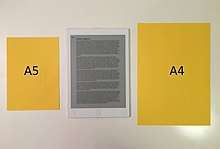reMarkable
reMarkable is an E Ink writer tablet for reading documents and textbooks, sketching and note-taking with the goal of a paper-like writing experience.[3] Developed by a Norwegian startup company of the same name, the device is geared towards students, academics, and professionals.[4] Development was started in 2013[5] and a crowdfunding campaign launched in late 2016.[6] Pre-orders began in 2017.[7]
 reMarkable tablet with sleeve and pen | |
| Manufacturer | reMarkable |
|---|---|
| Type | e-reader |
| CPU | 1 GHz ARM A9 CPU[1] |
| Memory | 512 MB DDR3L RAM[1] |
| Storage | 8 GB |
| Display | 262 mm (10.3 in) electronic paper display, 1872 × 1404 pixels (1.38:1 aspect ratio, close to the ISO 216 aspect ratio of √2:1, A5=10.1 in diagonal). |
| Input | Touchscreen with 2048 levels of pressure sensitivity, stylus without battery |
| Connectivity | Wi-Fi (2.4 GHz and 5 GHz),[2] Micro USB 2.0[1] |
| Power | Non-removable 3000 mAh lithium-ion battery[1] |
| Dimensions | 177 mm × 256 mm × 6.7 mm (6.97 in × 10.08 in × 0.26 in) |
| Mass | 350 g (12 oz) |
| Website | remarkable |
The reMarkable tries to blend the reading experience of an electronic paper display with the writing experience of a high end tablet computer through its low lag Linux operating system,[8] and is claimed to be solidly built.[5]
History
The company was founded by Magnus Wanberg and started product development in Oslo in early 2014. It has collaborated with Taiwanese company E Ink.[9]
Operating system
ReMarkable uses its own operating system, named Codex. Codex is based on Linux, but optimized for electronic paper display technology.[10]
Reception
Remarkable RM100, launched in late 2017, has been criticized because of sluggishness when loading and unloading files.[11] In March 2019 Vesa Linja-aho, a columnist for Finnish computer magazine Skrolli, dubbed the product overpriced, cleverly marketed toy, which no one would ever buy if they had a chance to try it in electronics outlet store, and compared it to nonsense stuff sold in the 90's mail order catalogues.[12]
 A PDF file on the reMarkable annotated with the passive pen
A PDF file on the reMarkable annotated with the passive pen Size of the reMarkable tablet compared to A4 and A5 sheets of paper
Size of the reMarkable tablet compared to A4 and A5 sheets of paper
References
- reMarkable | The paper tablet - Technical specifications
- RM100 reMarkable paper tablet Test Report WiFi reMarkable AS
- Hands on with the reMarkable, the closest thing to paper since paper
- reMarkable paper tablet for sketching, writing: PHOTOS - Business Insider
- The ReMarkable is a Tablet That Feels Like Paper | Digital Trends
- ReMarkable Hands-On: The First E-Ink Drawing Tablet Is a Wonder to Behold
- Remarkable Raises $12 Million in Pre-Orders, Gets Positive Early Buzz in the Press | The Digital Reader
- ReMarkable E-ink Tablet review | Trusted Reviews
- https://www.businessinsider.com/remarkable-paper-tablet-sketching-writing-photos-2017-5?r=US&IR=T
- Henry T. Casey (15 September 2017). "reMarkable Tablet Review". Laptop Magazine. Retrieved 8 June 2019.
reMarkable uses Codex, its own OS. This is a custom version of Linux that's optimized for low-latency e-paper.
- Liszewski, Andrew. "The reMarkable E Ink Tablet Is Way Too Good For Its Software (and Price)". Gizmodo. Retrieved 2 June 2014.
- Linja-aho, Vesa. "Kuponkiuutiset 2.0" (PDF). Skrolli. Retrieved 25 August 2019.